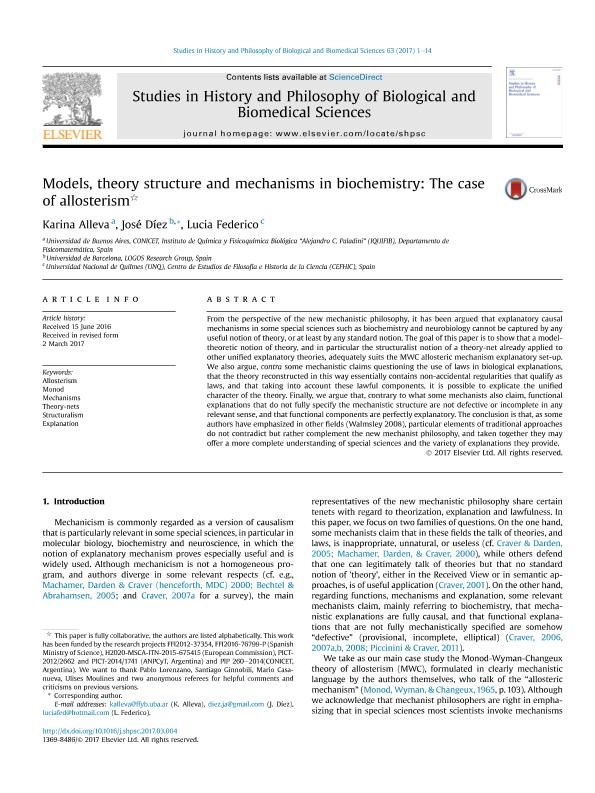Mostrar el registro sencillo del ítem
dc.contributor.author
Alleva, Karina Edith

dc.contributor.author
Diez, Jose Antonio
dc.contributor.author
Federico, Lucía
dc.date.available
2018-06-21T19:42:30Z
dc.date.issued
2017-06
dc.identifier.citation
Alleva, Karina Edith; Diez, Jose Antonio; Federico, Lucía; Models, theory structure and mechanisms in biochemistry: The case of allosterism; Elsevier; Studies in History and Philosophy of Science Part C :Studies in History and Philosophy of Biological and Biomedical Sciences; 63; 6-2017; 1-14
dc.identifier.issn
1369-8486
dc.identifier.uri
http://hdl.handle.net/11336/49588
dc.description.abstract
From the perspective of the new mechanistic philosophy, it has been argued that explanatory causal mechanisms in some special sciences such as biochemistry and neurobiology cannot be captured by any useful notion of theory, or at least by any standard notion. The goal of this paper is to show that a model-theoretic notion of theory, and in particular the structuralist notion of a theory-net already applied to other unified explanatory theories, adequately suits the MWC allosteric mechanism explanatory set-up. We also argue, contra some mechanistic claims questioning the use of laws in biological explanations, that the theory reconstructed in this way essentially contains non-accidental regularities that qualify as laws, and that taking into account these lawful components, it is possible to explicate the unified character of the theory. Finally, we argue that, contrary to what some mechanists also claim, functional explanations that do not fully specify the mechanistic structure are not defective or incomplete in any relevant sense, and that functional components are perfectly explanatory. The conclusion is that, as some authors have emphasized in other fields (Walmsley 2008), particular elements of traditional approaches do not contradict but rather complement the new mechanist philosophy, and taken together they may offer a more complete understanding of special sciences and the variety of explanations they provide.
dc.format
application/pdf
dc.language.iso
eng
dc.publisher
Elsevier

dc.rights
info:eu-repo/semantics/openAccess
dc.rights.uri
https://creativecommons.org/licenses/by-nc-sa/2.5/ar/
dc.subject
Allosterism
dc.subject
Explanation
dc.subject
Mechanisms
dc.subject
Monod
dc.subject
Structuralism
dc.subject
Theory-Nets
dc.subject.classification
Estudios Religiosos

dc.subject.classification
Filosofía, Ética y Religión

dc.subject.classification
HUMANIDADES

dc.title
Models, theory structure and mechanisms in biochemistry: The case of allosterism
dc.type
info:eu-repo/semantics/article
dc.type
info:ar-repo/semantics/artículo
dc.type
info:eu-repo/semantics/publishedVersion
dc.date.updated
2018-06-04T17:01:53Z
dc.journal.volume
63
dc.journal.pagination
1-14
dc.journal.pais
Países Bajos

dc.journal.ciudad
Amsterdam
dc.description.fil
Fil: Alleva, Karina Edith. Consejo Nacional de Investigaciones Científicas y Técnicas. Oficina de Coordinación Administrativa Houssay. Instituto de Química y Físico-Química Biológicas ; Argentina
dc.description.fil
Fil: Diez, Jose Antonio. Universidad de Barcelona; España
dc.description.fil
Fil: Federico, Lucía. Universidad Nacional de Quilmes; Argentina
dc.journal.title
Studies in History and Philosophy of Science Part C :Studies in History and Philosophy of Biological and Biomedical Sciences
dc.relation.alternativeid
info:eu-repo/semantics/altIdentifier/url/http://www.sciencedirect.com/science/article/pii/S1369848617300328
dc.relation.alternativeid
info:eu-repo/semantics/altIdentifier/doi/http://dx.doi.org/10.1016/j.shpsc.2017.03.004
Archivos asociados
